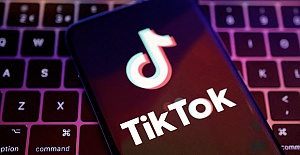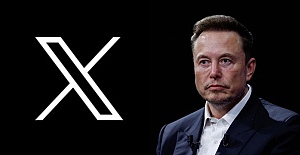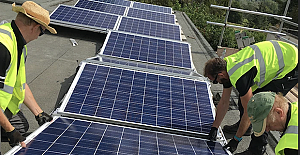ANKARA (AA) – As the world struggles to find new forms of energy, one significant source of increased demand is online-access devices, whose numbers are rising exponentially. The consumption of energy worldwide is expected to increase by more than 40 percent by 2035, as estimated by Chevron, an American multinational energy corporation. And one significant source of that increased demand is online-access devices. By 2025, their total energy consumption is projected to exceed the current annual energy consumption of all of Russia, according to a report released this month by International Energy Agency. Heavy use of networked devices such as computers, set-top boxes and printers has made the total consumption a significant issue worldwide. Each person in the world, on average, had at least two electronic devices last year, the agency said. The total number of such devices is projected to rise to 50 billion in 2020 and 100 billion in 2030, the organization said. The energy agency reported that the amount of electricity currently consumed by online access devices in 2013 was 616 terawatt hours -- an amount equal to Germany’s annual electricity consumption. This consumption is expected to rise 6 percent every year. If no measures are taken to increase energy efficiency, the amount of electricity used by online-access devices could consume 1,140 terawatt hours in 2025, more than the current electricity demand of the entire country of Russia, the report stated. - “Smart phones and new generation TV’s consume less” Online-access devices, on standby mode while not in use, wasted 80 percent of their total energy consumption last year, and the waste could increase over the next decade, the report said. However, if new technology is developed, that waste could be decreased, according to the report. Smart phones, which use a little energy to maintain their network connections, and new generation televisions are the best examples of devices that consume less energy that previous models, the report said. Energy efficiency is the least costly and most plentiful form of new energy the world has available, and growing demand, geopolitical pressures, and more remote and challenging resources continue to change the global energy landscape, Chevron said. “If we adopt today’s best available technologies, we can minimize the cost that meets the demand as the use and benefits of connected devices grow," said Maria van der Hoeven, Executive Director of the International Energy Agency. "In fact, such devices could perform exactly the same tasks in standby while using around 65 percent less power. So, just as our lives are becoming smarter and more connected so too must our approach to energy efficiency."
Online devices to soon consume more energy than Russia
29 Temmuz 2014 Salı 07:31
reads.



 Prime Minister Keir Starmer's 2025 Easter message
Prime Minister Keir Starmer's 2025 Easter message After Nesil Caliskan a by-election will be held in Jubilee ward in Enfield
After Nesil Caliskan a by-election will be held in Jubilee ward in Enfield Publishing the analysis, Labour’s Cllr Ergin Erbil said Everybody in Enfield deserves basic rights
Publishing the analysis, Labour’s Cllr Ergin Erbil said Everybody in Enfield deserves basic rights Gaza-Israel conflict Statement from Cllr Ergin Erbil, Leader of Enfield Council
Gaza-Israel conflict Statement from Cllr Ergin Erbil, Leader of Enfield Council UK AMBASSADOR TO TURKEY VISITS FETHIYE
UK AMBASSADOR TO TURKEY VISITS FETHIYE Journalists from Europe held the Turkish Media Workshop in Skopje
Journalists from Europe held the Turkish Media Workshop in Skopje The European Union called on Turkey to uphold democratic values
The European Union called on Turkey to uphold democratic values Turkish citizens in London said Rights, Law, Justice
Turkish citizens in London said Rights, Law, Justice The 'Prince of Paris' has impressed in his first EuroLeague season
The 'Prince of Paris' has impressed in his first EuroLeague season Saran Media And Euroleague Basketball Extend Media Rights Partnership for Four More Years
Saran Media And Euroleague Basketball Extend Media Rights Partnership for Four More Years Will Rangers be Jose Mourinho’s next victim?
Will Rangers be Jose Mourinho’s next victim? Jose Mourinho's Fenerbahce face Rangers on Thursday
Jose Mourinho's Fenerbahce face Rangers on Thursday Residents welcomed back to Edmonton Leisure Centre
Residents welcomed back to Edmonton Leisure Centre Barclays has become the biggest UK lender so far to cut mortgage rates
Barclays has become the biggest UK lender so far to cut mortgage rates THE SPRING STATEMENT EXPLAINED, UK ECONOMIC OUTLOOK AND GROWTH FORECASTS
THE SPRING STATEMENT EXPLAINED, UK ECONOMIC OUTLOOK AND GROWTH FORECASTS Launch of Made in Enfield gift shop to celebrate local artists and designers
Launch of Made in Enfield gift shop to celebrate local artists and designers



















